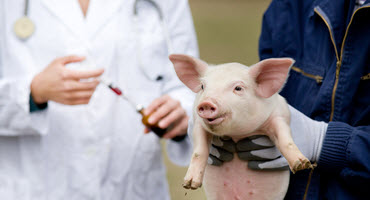
Jevtic\iStock\Getty Images Plus photo
Government and academic investigators have developed a vaccine against African swine fever that appears to be far more effective than previously developed vaccines. The research appears this week in the Journal of Virology, a publication of the American Society for Microbiology.
Currently, there is no commercially available vaccine against African swine fever, which has been devastating the swine industry in Eastern Europe and Southeast Asia. African swine fever virus (ASFV) is highly contagious and often lethal to domestic and wild pigs. Outbreaks have been quelled—more or less—"by animal quarantine and slaughter," according to the report. (Humans are not susceptible to ASFV.)
In the study, both low and high doses of the vaccine were 100% effective against the virus when the pigs were challenged 28 days post-inoculation.
The research was motivated by the 2007 outbreak of African swine fever in the Republic of Georgia, said principal investigator Douglas P. Gladue, Ph.D., Senior Scientist, Plum Island Animal Disease Center, Agricultural Research Service, US Department of Agriculture. "This was the first outbreak in recent history outside of Africa and Sardinia—where swine fever is endemic—and this particular strain has been highly lethal and highly contagious, spreading quickly to neighboring countries." This is also a new strain of the virus, now known as ASFV-G (the G stands for Georgia).
The 2007 outbreak was also the genesis of the African swine fever that has been spreading through Eastern Europe and east Asia, said Manuel V. Borca, Ph.D., also a Senior Scientist at the Plum Island Animal Disease Center.
There is limited cross-protection between strains of African swine fever, likely because the antigens and degree of virulence differ among them, and none of the historical experimental vaccines have been shown to be effective against ASFV-G, said Dr. Gladue.
So the investigators at Plum Island Animal Disease Center set out to develop a vaccine. Part of the process of developing whole virus vaccines involves deleting virulence genes from the virus. But when the researchers deleted genes similar to those that had been deleted in older ASFV strains to attenuate them, "it became clear that ASFV-G was much more virulent" than the other, historical isolates, because it retained a higher level of virulence, said Dr. Gladue. The investigators then realized they needed a different genetic target in order to attenuate ASFV-G.
Click here to see more...